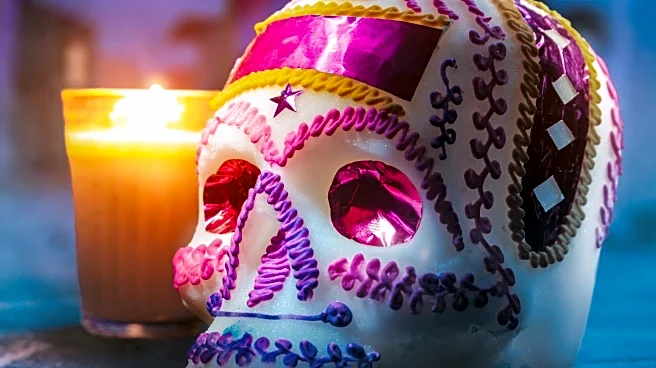What's Happening?
The Dia de Muertos, or Day of the Dead, is a time for reflection and remembrance within the Latinx community, as highlighted in a recent narrative. The story focuses on a father's efforts to connect his young daughter with her deceased grandfather through
daily rituals. This personal account underscores the cultural significance of Dia de Muertos, a holiday that allows individuals to honor their ancestors and maintain familial bonds beyond death. The narrative also touches on the broader Latinx experience, emphasizing the importance of storytelling and cultural traditions in preserving family history and identity.
Why It's Important?
Dia de Muertos has gained popularity in the United States, partly due to its ability to address the often-taboo subject of death in a culturally meaningful way. This holiday provides a framework for individuals to explore their heritage and familial connections, fostering a sense of continuity and belonging. For the Latinx community, it serves as a vital cultural touchstone, reinforcing identity and community ties. The narrative illustrates how personal rituals and public celebrations can help individuals process grief and maintain connections with deceased loved ones, offering emotional support and cultural affirmation.
What's Next?
The Los Angeles Times has launched its fifth digital altar project, allowing individuals to create virtual ofrendas, or offerings, for their deceased loved ones. This initiative aims to replicate the communal experience of Dia de Muertos celebrations, which were disrupted by the COVID-19 pandemic. Additionally, a public celebration is scheduled in Boyle Heights, featuring traditional activities such as face painting and sugar skull decorating. These events provide opportunities for the Latinx community to engage with their cultural heritage and share their stories, ensuring the continued relevance and evolution of Dia de Muertos traditions.
Beyond the Headlines
The growing popularity of Dia de Muertos in the U.S. reflects a broader cultural shift towards embracing diverse traditions and narratives. This acceptance allows for a richer tapestry of cultural expression and understanding, promoting inclusivity and respect for different heritages. The holiday's emphasis on storytelling and remembrance also highlights the universal human need to connect with the past and find meaning in life's transitions, offering a valuable perspective on how cultures can adapt and thrive in a multicultural society.

















